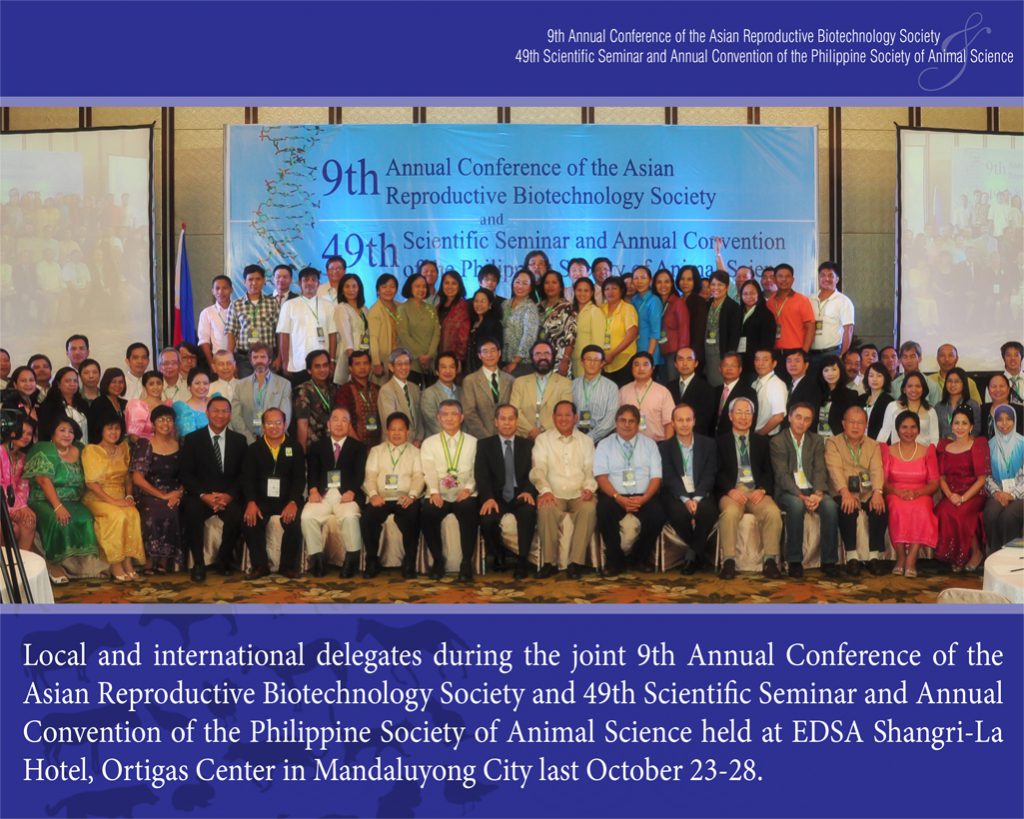Efficient utilization and application of biotechnology hold promise of increased production, food security, improved human and animal health, conservation of animal genetic resources, and reduced negative environmental impact.
This was the key message brought out in the joint 9th Asian Reproductive Biotechnology Society (ARBS) Annual Conference and 49th Scientific Seminar and Annual Convention of the Philippine Society of Animal Science (PSAS) held last October 23-28 at Edsa Shangri-La Hotel, Ortigas Center in Mandaluyong City.
Mr. Kazuyuki Tsurumi, Food and Agriculture Organization (FAO) representative to the Philippines, aptly said: “Application of new technologies, specifically biotechnology, is needed to address economic upturn locally and globally.”
Supporting this statement, Dr. Libertado Cruz, executive director of the Philippine Carabao Center, reiterated that Assisted Reproductive Technologies (ART) in animals such as the widely-used artificial insemination (AI) and embryo transfer (ET) have become important tools for enhanced genetic improvement allowing production of productive and efficient farm animals. Dr. Cruz was one of the plenary speakers during the conference.
Other important biotechniques which Dr. Cruz pointed out in his talk were the use of semen cryopreservation and semen-sexing which are vital to the development of AI. On the other hand, he added, ET, aided by several techniques such as hormone manipulation of ovarian function, in vitro embryo production and cryopreservation, ovum pick-up (OPU), and embryo micromanipulation, has become the platform of many other ARTS such as cloning (somatic cell nuclear transfer) and transgenesis.
It will be recalled that the Philippine Carabao Center, under Administrative Order No. 09 of the Department of Agriculture, was designated as the lead agency to hasten genetic improvement program in ruminants using reproductive and gene-based biotechniques. As such, it continuously carries out research endeavours with support from local governments and international partners.
As a result of the agency’s research undertakings, the Philippines’ efforts on improving livestock production, particularly Carabao, have been constantly gaining headways thru the utilization of available biotechniques such as ET and AI for improved animal husbandry. They, in turn, result in improved livelihood of many rural farming families in the country.
Meanwhile, as a venue for interactive exchange of scientific interests of the reproductive biotechnology community throughout Asia, the ARBS members presented their respective studies, both in human and animals, using biotechniques.
Among the studies presented were “Advances in mammalian egg activation and development”, “Biomedical basis and regulation of sperm capacitation and motility in vitro”, “Factors affecting meiotic arrest in mammalian oocytes” , “Development of frozen buffalo semen production system in the Philippines”, and many others. These researches were tackled thru the scientific sessions during the conference.
“With these significant research findings that can be applied in many developing countries, the challenge, therefore, is how to fully take advantage of the potentials of biotechnology in increasing domestic animal production and reduce importations while constantly mitigating climate change,” Dr. Cruz concluded.
The other highlights in the joint conference were the presentation of technical papers and scientific posters, handing of awards for the ARBS best poster and PSAS best papers and posters, and the conferment of awards to outstanding local scientists and veterinarians.

